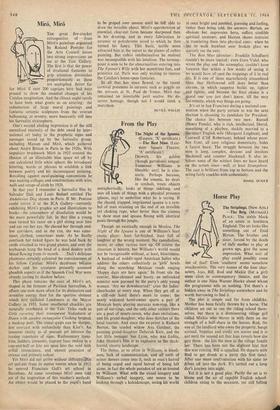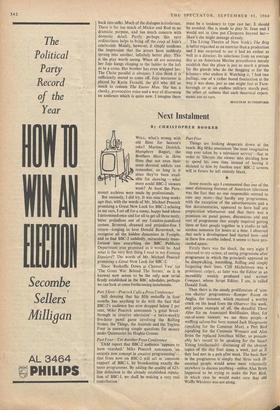Horse Play
The Striplings. (New Arts.) The plot is simple and far from childlike. Mother has been fatally thrown by a horse. The children set out to run the riding school them- selves, but there is a domineering village girl called Mickie who moves in with them on the strength of a half-share in the horses. Rod, the son of the landlord who owns the property, hangs around. Supplies and credit are scarce and it is not until the second act that Jojo reveals how she gets them: she lets the men in the village fondle her. There has been not the slightest hint that this was coming. Biff is appalled. He departs with Rod to get drunk at a party (his first time). After one more confrontation with his sister he drives off into the dark. It's turned out a long day's journey into night.
Yet it is not a good play. Partly the set is to blame and the air of capable English school- children rising to the occasion, yet still falling back into sulks. Much of the dialogue is irrelevant. There is far too much of Mickie and Rod to no dramatic purpose, and too much concern with domestic detail. Partly perhaps this very ordinariness helps to bring off the coup of Jojo's confession. Mainly, however, it simply confirms the impression that the actors have suddenly sprung into another, infinitely better play. This is the play worth seeing. When all are accusing her Jojo hangs clinging to the ladder to the loft as to a cross. Her brother has even whipped her. The Christ parallel is obvious; I also think it is sufficiently muted to come off. Jojo moreover is played by Karin Fernald, the girl who did so much to redeem The Easter Man. She has a cheeky, provocative voice and a way of disarming an audience which is quite new. I imagine there
must be a tendency to type cast her. It should be avoided. She is made to play St. Joan and I would not in time put Cleopatra beyond her— Shaw's she might manage already.
The Living Theatre of New York's The Brig is better regarded as an exercise than a production and I was surprised to see it had an author as well as a director. Its selections from an average day at an American Marine prisonhouse merely establish that the place is just as much a prison for the guards who do the thugging as for the prisoners who endure it. Watching it„( had two feelings, one of a rather bored fascination at the way it was done, just as one might feel at Farn- borough or at an endless military march past, the other of sadness that such theatrical experi- ments are so rare.
MALCOLM RUTHERFORD































 Previous page
Previous page